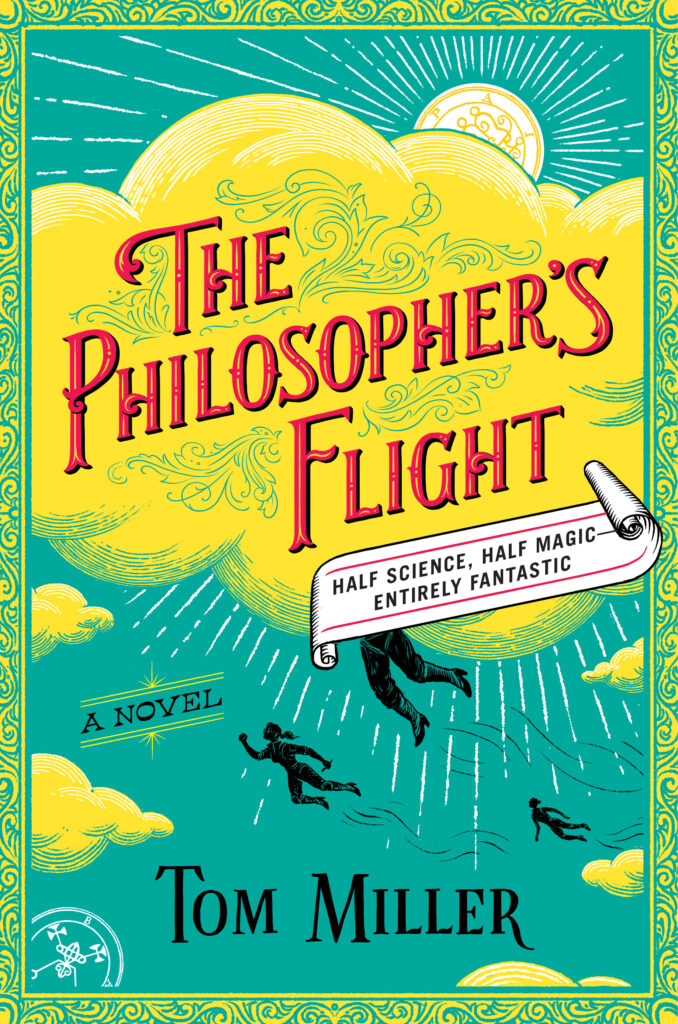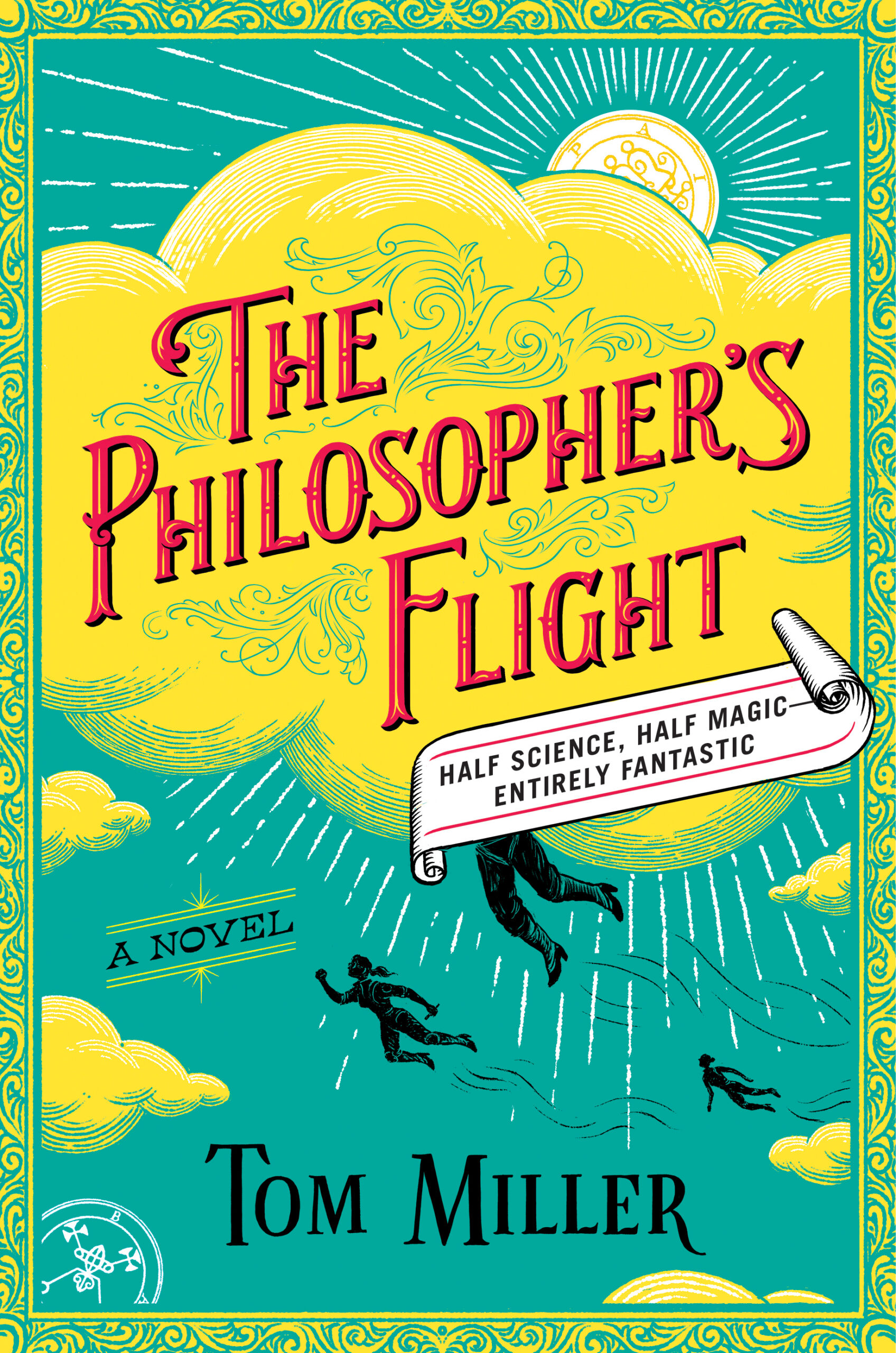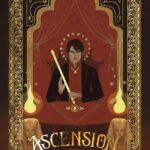
Genres: Fantasy, Historical Fantasy
Representation: Black biracial love interest, minor sapphic characters
ISBN: 1476778159
Goodreads
A thrilling debut from ER doctor turned novelist Tom Miller, The Philosopher’s Flight is an epic historical fantasy set in a World-War-I-era America where magic and science have blended into a single extraordinary art.
Eighteen-year-old Robert Weekes is a practitioner of empirical philosophy—an arcane, female-dominated branch of science used to summon the wind, shape clouds of smoke, heal the injured, and even fly. Though he dreams of fighting in the Great War as the first male in the elite US Sigilry Corps Rescue and Evacuation Service—a team of flying medics—Robert is resigned to mixing batches of philosophical chemicals and keeping the books for the family business in rural Montana, where his mother, a former soldier and vigilante, aids the locals.
When a deadly accident puts his philosophical abilities to the test, Robert rises to the occasion and wins a scholarship to study at Radcliffe College, an all-women’s school. At Radcliffe, Robert hones his skills and strives to win the respect of his classmates, a host of formidable, unruly women.
Robert falls hard for Danielle Hardin, a disillusioned young war hero turned political radical. However, Danielle’s activism and Robert’s recklessness attract the attention of the same fanatical anti-philosophical group that Robert’s mother fought years before. With their lives in mounting danger, Robert and Danielle band together with a team of unlikely heroes to fight for Robert’s place among the next generation of empirical philosophers—and for philosophy’s very survival against the men who would destroy it.
In the tradition of Lev Grossman and Deborah Harkness, Tom Miller writes with unrivaled imagination, ambition, and humor. The Philosopher’s Flight is both a fantastical reimagining of American history and a beautifully composed coming-of-age tale for anyone who has ever felt like an outsider.
Highlights
~it’s magic, it’s science, but only women have it
~mostly
~girl-wants-to-be-a-knight-story, but it’s a guy and he wants to fly
Well, folx, I have a new favourite series.
In Miller’s world, women’s rights have arrived a good 100 years early – thanks to the magical science simply known as empirical philosophy, which involves the drawing of sigils that allow the user to fly, teleport, put an injured person in life-saving stasis, and almost anything else you can think of. But what makes The Philosopher’s Flight unique is – women, for some unknown reason, are by far more powerful philosophers than men.
You can see how women got the right to vote a fair bit earlier than in our own timeline, can’t you?
Not that everyone approves of philosophy; far from it. The Trenchers are what we might today call a Far-Right or alt-right group, insisting that philosophy is Satanic magic and that women ought to be submissive and meek and all the rest of it – rather than winning America’s wars and generally taking up space. It’s a conflict that might keep to verbal battles in urban centres (mostly) but regularly bursts into bloody vendettas in more rural areas, where philosopher veterans of several wars aren’t even slightly afraid to fight back – with extreme prejudice.
The Philosopher’s Flight introduces us to the situation quickly; not long after the opening pages, Robert and his mother, who is the County Philosopher (a position that seems to be a little bit of everything, but not least Emergency Responder), go on call to find a philosopher and her family brutally murdered. Robert’s mother makes it perfectly clear that she and her old army buddies are going to hunt down the utter monsters who did this – which is viscerally satisfying, on one level, but does leave the reader well aware that the capacity for monstrousness exists on both sides.
And I think that’s a pretty crucial aspect of this book. In some ways it reminds me of Naomi Alderman’s The Power, wherein women of the modern world gain the ability to generate electric shocks, flipping the patriarchy around. But the point of The Power is that a matriarchy wouldn’t be any better than a patriarchy, that women aren’t inherently any better than men. The Philosopher’s Flight is very much making the same point: now that the women of Miller’s world have philosophy, there are plenty of them willing to be terribly, horrifyingly vicious. Miller doesn’t waste time discussing whether or not women are intrinsically less violent; he dives straight into the story with the premise that everyone can be terrible – gender (or sex) has nothing to do with it.
Robert’s most fervent desire is to join Flight & Evac, the best fliers in the world, who use their philosophy to save lives, not take them. Everyone tells him to pick a better dream: Flight & Evacuation has never accepted a male applicant, and no one thinks they ever will. But a dream is a dream, and Robert knows he’s good enough – or could be – if those judging him can see past his sex, so off he goes to study practical philosophy on the East Coast, which may as well be a whole ‘nother world for how different it is to the tiny, rural town he’s grown up in.
The Serious Stuff
The Philosopher’s Flight is set up like a girl-who-wants-to-be-a-knight story with the genders reversed, but I always had the sense that Miller understood that girl-who-wants-to-be-a-knight is not, quite, the same as boy–who–wants-to–be-a-witch (for lack of a better term). Or at least, it’s not the same if you haven’t swapped out the patriarchy for a matriarchy, and although Robert’s life is full of powerful women, I do think the world he lives in is still a patriarchy. Which means that he’s a man wanting to enter what has been a women-only space, career, and practice, in a world where men still run and own everything else. Which made me uncomfortably sympathetic towards the female philosophers who resented Robert’s presence; they behave completely unacceptably, but a part of me understood. Philosophy is the one advantage women have over men – and here’s a man trying to push his way into this too. I get why they’d be unhappy. Men already own the world, can’t we have one thing that’s just for us?
To the men the earth, to the women the sky, as God willed it.
And the answer to that is – no. No, no, and no again! The Power made it clear that women in charge of everything wouldn’t be any better than men; The Philosopher’s Flight, especially in its (excellent) choice to tell Robert’s story in first-person, strips away any attempt to suggest that this is ‘different’ because the one being persecuted is a man. It’s not! It isn’t! Robert is still a human being, with feelings and hopes and things he desperately wants. He loves philosophy, and the micro- (and macro-)aggressions he has to endure hurt and frustrate and exhaust him just as they would anyone of any other gender. He doesn’t deserve it, and no one loses anything by letting him study and practise and take part. If he’s not good enough to qualify, that’s one thing. But shutting the door on him for any other reason is just – no.
There are many things which are not made smaller when they’re shared. Rights are one of those things. Giving Robert the right to learn and practice philosophy doesn’t take away anything from anyone else. So there’s no good reason not to share.
The Fun Stuff (aka EVERYTHING ELSE)
This makes The Philosopher’s Flight sound very pretentious and also grim, and it’s neither of those things. If you have any kind of empathy at all, the prejudice Robert has to fight against will enrage you – but this is fundamentally a really clever, fun book, with a wonderful cast ranging from Robert himself, to his college roommate Unger (anyone who introduces himself with “I have 138 bow ties” has a friend in me forever), to the fabulous cadre of fliers who adopt him without question, to his incredible love interest Danielle – and that’s without getting into secondary characters like the Cocks team, the delightfully eccentric dean of the college, and Robert’s utterly terrifying (and utterly brilliant) mother.
I adored the worldbuilding – Miller has really sat down and thought through how much of a difference empirical philosophy would make to everything, and incorporated it really well. Empirical philosophy was conceived of during war-time, but it’s not just for scary stuff: the ability to put injured people into stasis, for example, makes a huge difference in medical emergencies, and teleporters trading off to take groups across the country (or even across the Atlantic) pretty neatly nixes the need for things like trains. Despite a setting otherwise mimicking the 1910s, characters effectively have email, since sending messages via philosophy is one of the easiest and most accessible things you can do. And sigils for contraceptives give women as enormous an amount of freedom as chemical contraceptives did for women in our world, allowing for female characters who are much more sex-positive than they might be otherwise. The women we encounter throughout the book have been shaped by their power, and it makes sense and it works.
And if you’ve been craving a good magic-school story, well, Radcliffe College might do the trick for you: although we don’t see many of Robert’s lessons, outside of his flying classes, we do get
- secret underground philosophical clubs
- the horrible Trenchers plotting the downfall of philosophers in general and Robert in particular
- beautiful magical cocktails and spelled ceilings
- over-enthusiastic students creating brand-new sigils
- and even an inter-college Cup where hoverers (philosophers specialising in flight) compete against each other
and it makes so much more sense than quidditch!!!
There’s really almost nothing you won’t love here!
THE COCK CAN FLY, BUT CAN HE FIGHT?
THE COCK PERSISTS, BUT WILL HE ENDURE?
TONIGHT THE COCK MUST CROW AT MIDNIGHT OR GO SILENT FOR ALL TIME.
Successive notes Robert receives from the Cocks…
With the promise of game-changing epicness to come. The prologue is set long after the events of this first book, so we know Something has gone Very Wrong Indeed, but Miller doesn’t stop there and let us forget about it; at the beginning of every chapter is an excerpt from a fictitious book or article related to empirical philosophy…and if the reader pays attention to the timestamps on those excerpts??? It’s clear something absolutely enormous is coming down the pipe. I’m sure it’s going to involve the Great War Robert’s America is currently a part of on the other side of the Atlantic, and maybe there’ll even be an alternate WW2 to deal with, but those excerpts gave me chills. Some of them are even excerpts of future!Robert’s books and speeches! I’ve never seen that before, and it’s so clever, and it has me SCREECHING for the next book!
(Which, yes, I am already reading. BUT WHERE’S MY BOOK THREE??? Forget Thorn of Emberlain, I need the next Philosopher’s book asap!!!)
That Said: MAKE IT QUEERER
I guess one point I do need to make is that gender-specific magic always makes me a little wary, because it never seems to account for the fact that human gender (and sex) is a spectrum; and I was disappointed (but not very surprised) that Miller didn’t make any mention of how the female/male power split in philosophy affects or is affected by nonbinary, intersex, and other genderqueer people. On the one hand, this book is set in the 1910s, when the idea of gender as a spectrum was pretty much Not A Thing in the USA, and the Philosopher series is set to have four more books, which gives some hope that the question may be answered at some later point. (Maybe it will eventually come out that the power for empirical philosophy comes from the X chromosome, and Robert’s extraordinary (for a man) power comes from him being intersex! That’d be epic.) On the other… Miller’s not got the cishet blinkers on too tightly – the philosophical community, particularly the military corps’, are known for being rife with ‘sapphists’, and Robert is asked quite bluntly on several occasions if he’s gay, as that’s the only reasonably explanation several idiots can come up with for why a man wants to be a philosopher. So if Miller’s smart enough to bring queer sexuality into it, I’m really hoping genderqueerness will at least be acknowledged eventually.
IN CONCLUSION
But there is no getting around the fact that this is one of the most original and fun books I’ve read in YEARS, and I love it more than words can say, and I’m positive that you’ll love it too if you give it a try. Miller is an incredible writer (I can’t believe this was his debut!) and Robert is an equally incredible main character – I don’t enjoy first-person very often, but I’m so glad Miller didn’t go with third- for this one.
Look, it’s not very often a male-authored book makes it onto my Crescent Classics list – the SFF books I consider must-reads, the best of the best. I’m picky as hell, and I don’t read many male authors to start with. But The Philosopher’s Flight? Is without question a must-read. Is absolutely among the best of the best. From the first page to the last, I couldn’t get enough of Miller’s writing or Robert’s voice.
Or the world.
Or the story.
SERIOUSLY, GO BUY IT AND READ IT AND COME SCREAM ABOUT IT WITH ME, OKAY?
OKAY.




Leave a Reply